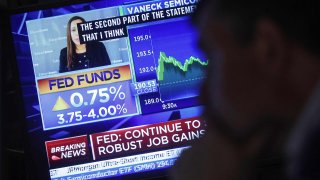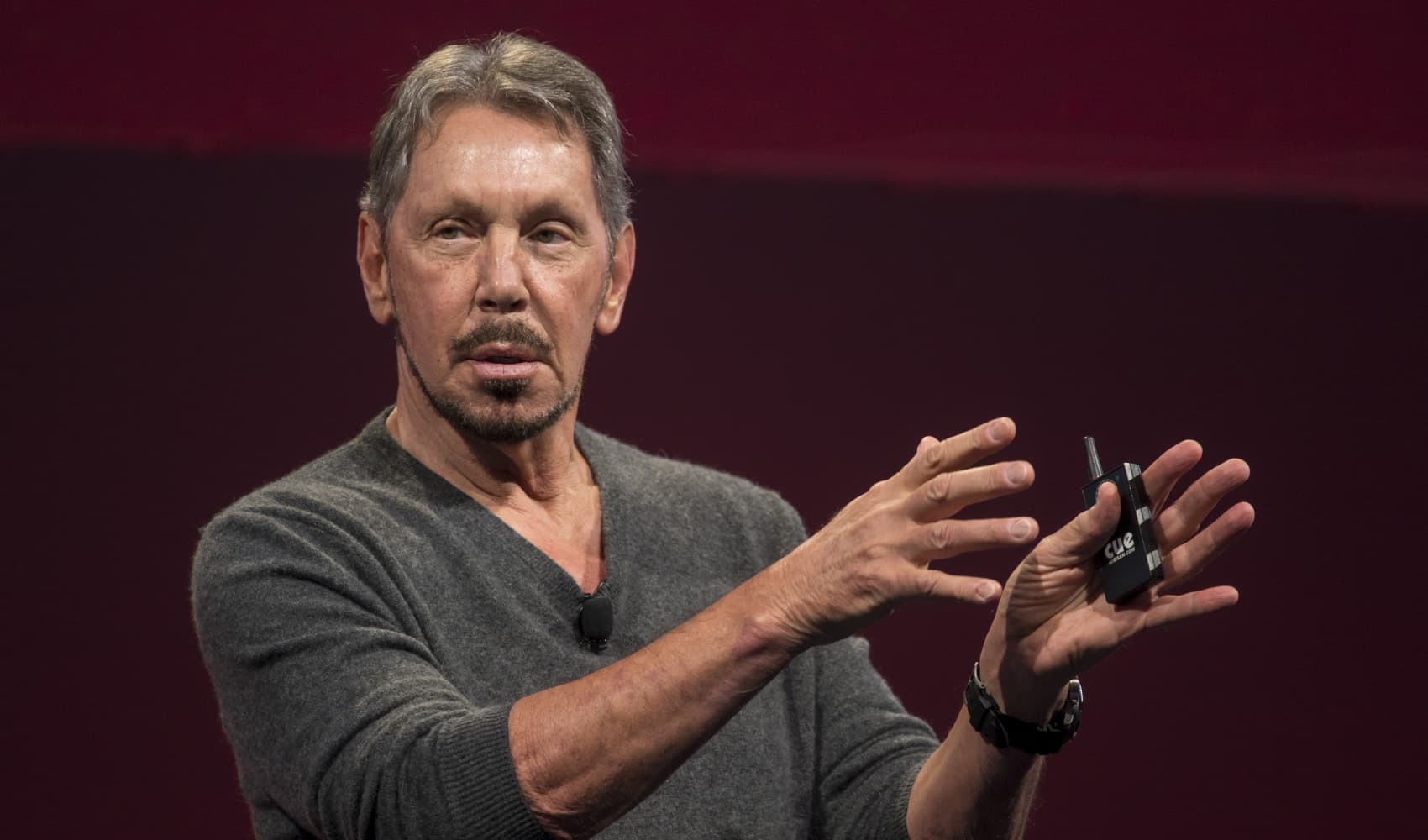
- Economists will be watching policymakers' rhetoric closely for clues on the path of future rate hikes this year, as three major central banks try to engineer a soft landing for their respective economies without allowing inflation to regain momentum.
- The Federal Open Market Committee concludes its meeting on Wednesday, before the Bank of England and European Central Bank deliver their decisions on Thursday.
The U.S. Federal Reserve, European Central Bank and Bank of England are all expected to hike interest rates once again this week, as they make their first policy announcements of 2023.
Economists will be watching policymakers' rhetoric closely for clues on the path of future rate hikes this year, as the three major central banks try to engineer a soft landing for their respective economies without allowing inflation to regain momentum.
All three banks are expected to re-emphasize commitments to returning inflation toward targets near 2%, but recent positive data have fueled hopes that central banks will eventually be able to slow the pace of rate hikes.
Get DFW local news, weather forecasts and entertainment stories to your inbox. Sign up for NBC DFW newsletters.
Nick Chatters, fixed income manager at Aegon Asset Management, said that the task for market watchers is to "telegraphically infer" from this week's press conferences what Fed Chairman Jerome Powell and ECB President Christine Lagarde are thinking about the "terminal rate," and how long they intend to keep monetary policy restrictive before starting to normalize.
The Federal Open Market Committee concludes its meeting on Wednesday, before the Bank of England and ECB deliver their decisions on Thursday.
The Fed
Money Report
Since the FOMC's December meeting, economic data showing an easing of wage growth and inflation pressures, alongside some more concerning activity growth signals, have strengthened the case for the Fed to enact a 0.25 percentage point rate hike — a marked downshift from the jumbo moves seen in 2022.
The market is now pricing in this eventuality, but the key question is what the FOMC will indicate about further rate hikes in 2023.
"We think the Fed's path this year is best thought of in terms of a goal to be accomplished rather than a target level of the funds rate to be reached," Goldman Sachs Chief U.S. Economist David Mericle said in a note Friday.
"The goal is to continue in 2023 what the FOMC began so successfully in 2022 by keeping the economy on a below-potential growth path in order to steadily but gently rebalance the labor market, which should in turn create the conditions for inflation to settle sustainably at 2%."
Fed officials have indicated there is still a way to go before they are confident that inflation will settle at this level. Mericle said substantial "labor market rebalancing" will be needed, as the gap between jobs and workers is still around 3 million above its pre-pandemic level.
This will necessitate a slower growth path for a while longer. Goldman expects a 25 basis point hike on Wednesday, followed by two further rises of the same scale in March and May — in steps that would take the target rate for the Fed funds rate to a peak of between 5% and 5.25%.
"Fewer hikes might be needed if the recent weakening in business confidence captured by the survey data depresses hiring and investment more than we think, substituting for additional rate hikes," Mericle said.
"But more hikes might be needed if the economy reaccelerates as the drag on growth from past fiscal and monetary policy tightening fades."
The uncertainty over the growth pace could lead the Fed to "recalibrate" and find itself in a "stop-and-go" pattern on rates later in the year, he suggested.
The ECB
The ECB has telegraphed a 50 basis point hike for Thursday and vowed to stay the course on tackling inflation, but uncertainty lingers around the future rate trajectory.
Euro zone inflation dropped for a second consecutive month in December, while Tuesday revealed that the bloc's economy unexpectedly expanded by 0.1% in the fourth quarter of 2022, curbing recession fears.
The anticipated half-point hike will take the ECB's deposit rate to 2.5%. The Governing Council is also expected to detail plans to reduce its APP (asset purchase program) portfolio by a total of 60 billion euros ($65 billion) between March and June.
In a Tuesday note, Berenberg projected that the ECB will "probably" confirm its prior guidance for a further 50 basis point hike in mid-March, followed by further tightening in the second quarter.
The German investment bank highlighted that, while there are positive signs in headline inflation, stickier core inflation — which came in at 5.2% in December — has not yet peaked.
"We expect the ECB to leave the size and number of its moves in Q2 open. The risks to our call for just one final 25bp rate hike in Q2 to take the deposit and main refinancing rates to peaks of 3.25% and 3.75%, respectively, on 4 May are tilted to the upside," said Berenberg Chief Economist Holger Schmieding.
"In line with the ECB's recent 'higher for longer' mantra, ECB President Christine Lagarde will likely push back against market expectations that the bank will start cutting rates again late this year or in early 2024."
Upon slowing its rate hikes from 75 basis points to 50 basis points in December, the ECB spooked markets with the assertion that rates would need to "rise significantly at a steady pace to reach levels that are sufficiently restrictive." Schmieding said this sentence will be one to watch on Thursday:
"The ECB will probably confirm that it is progressing at a 'steady pace' (read: 50bp in March and possibly beyond) without pre-committing to either a 25bp or 50bp move in May," Schmieding said.
"But as rates will now be 50bp higher than at the last ECB press conference, the doves may suggest that the ECB should now use a slightly softer term than 'significantly'."
The Bank of England
A key distinction between the task of the Bank of England and those of the Fed and ECB is the persistently bleak outlook for the U.K. economy.
The Bank previously forecast that the U.K. economy was entering its longest recession on record, but GDP unexpectedly grew by 0.1% in November after also exceeding expectations in October, suggesting the recession may not be as deep as promised.
However, the International Monetary Fund on Monday downgraded its projection for U.K. GDP growth in 2023 to -0.6%, making it the world's worst performing major economy, behind even Russia.
Most economists anticipate a split decision among the Monetary Policy Committee in favor of another 50 basis point hike on Thursday — taking the Bank rate to 4% — but expect a more dovish tone than in recent meetings.
Barclays expects a 7-2 split vote in favor of one final "forceful" 50 basis point rise, with communications foreshadowing a step down to 25 basis points in March.
"This may be signalled via removing, or softening, the 'forceful' component of the forward guidance. Such a tweak would be consistent with our call for a final two 25bp hikes in March and May, taking the terminal rate to 4.5%," analysts at the British lender said in a note Friday.
Victoria Clarke, U.K. chief economist at Santander CIB, expects a far closer 5-4 majority at the MPC in favor of the 50 basis point hike, with the four dissenters split between "no change" and a 25 basis point increase. She said the Bank has "no easy options."
"Given the concern over the damage embedded inflation would cause, we believe that a majority of the MPC will consider an increase in Bank Rate to 4.00% to be prudent risk management, but we still do not think it wishes to take Bank Rate far above this," Clarke said in a note Friday.
Santander expects a "double but dovish hike" in February and March, and Clarke suggested that Governor Andrew Bailey is "optimistically" watching falling headline inflation, while becoming increasingly worried about the prospects for the U.K. housing market.






